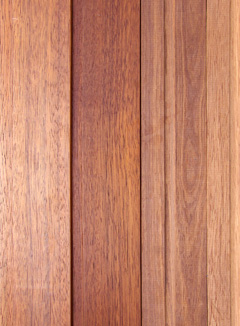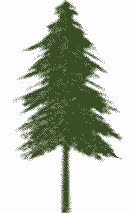 |
|
International Institute of Tropical Agriculture |
 |
|
Translate this page:
Summary
Angelique or Dicorynia guianensisi is a tree commonly found in Northern South America that reaches a height of up to 45 m. The bole is straight and cylindrical which can be 150 cm in diameter. The tree is heavily buttressed. It is highly resistant to decays and moderately resistant to marine borers? damage making it ideal for marine constructions. The wood is also used as construction material and for bridge flooring, boat framing, carriage work, crossties, furniture, etc.
Physical Characteristics

 Dicorynia guianensis is an evergreen Tree growing to 35 m (114ft) by 20 m (65ft) at a medium rate.
Dicorynia guianensis is an evergreen Tree growing to 35 m (114ft) by 20 m (65ft) at a medium rate.
See above for USDA hardiness. It is hardy to UK zone 10.
It can fix Nitrogen.
Suitable for: light (sandy), medium (loamy) and heavy (clay) soils. Suitable pH: mildly acid, neutral and basic (mildly alkaline) soils. It cannot grow in the shade. It prefers moist or wet soil.
UK Hardiness Map
US Hardiness Map
Synonyms
Plant Habitats
Edible Uses
References More on Edible Uses
Medicinal Uses
Plants For A Future can not take any responsibility for any adverse effects from the use of plants. Always seek advice from a professional before using a plant medicinally.
None known
References More on Medicinal Uses
The Bookshop: Edible Plant Books
Our Latest books on Perennial Plants For Food Forests and Permaculture Gardens in paperback or digital formats.

Edible Tropical Plants
Food Forest Plants for Hotter Conditions: 250+ Plants For Tropical Food Forests & Permaculture Gardens.
More

Edible Temperate Plants
Plants for Your Food Forest: 500 Plants for Temperate Food Forests & Permaculture Gardens.
More

More Books
PFAF have eight books available in paperback and digital formats. Browse the shop for more information.
Shop Now
Other Uses
Furniture Wood
Other Uses: The heartwood is a russet colour when first cut, turning on exposure to a lustrous brown, often with a distinct reddish cast; it is sharply demarcated from the 2 - 10cm wide band of reddish sapwood. The texture is medium, the grain usually straight, with no distinctive odour or taste present in seasoned wood. In the green condition, angelique is similar to teak in most strength properties and clearly superior to white oak. It is about equal to the average for timbers of similar density in bending strength, elastic resilience, hardness, compression across the grain, shear, and toughness. It is above average in stiffness and in work to maximum load, slightly above average in crushing strength, but falls slightly below the average in tension across the grain and cleavage resistance. In the air-dry condition, angelique is superior to teak in all mechanical properties except tension perpendicular to the grain. It is superior to white oak in static-bending properties, compression parallel to the grain, and end hardness; comparable in shock resistance, side hardness, and compression across the grain; and inferior to white oak in shear, tension across the grain, and cleavage resistance. The working qualities vary according to the density and silica content but are generally rated as satisfactory. The wood finishes smoothly, splits easily, glues moderately well, and holds its place well under changes in atmospheric conditions. The wood is durable to very durable. The high resistance to decay and moderate resistance to damage by marine borers as well as its very good strength properties make angelique highly acceptable in marine construction for piling, poles, posts, and other similar uses where teredo are not a major factor. The wood is commonly used for construction purposes, bridge flooring, boat framing, carriage work, and crossties. To a limited extent, it, is also used for furniture, barrel staves, and parquet, strips and blocks. Because of small radial shrinkage, quartersawn material is considered suitable for flooring and for boat decks, frames, planking and millwork, general building construction, and agricultural implements[ 378 , 848 ].
Special Uses
Nitrogen Fixer
References More on Other Uses
Cultivation details
In the wild the plant thrives best in deep, loamy, well-drained soils, but can also grow in wetter areas[ 378 ].
References Carbon Farming Information and Carbon Sequestration Information
Temperature Converter
Type a value in the Celsius field to convert the value to Fahrenheit:
Fahrenheit:
The PFAF Bookshop
Plants For A Future have a number of books available in paperback and digital form. Book titles include Edible Plants, Edible Perennials, Edible Trees,Edible Shrubs, Woodland Gardening, and Temperate Food Forest Plants. Our new book is Food Forest Plants For Hotter Conditions (Tropical and Sub-Tropical).
Shop Now
Plant Propagation
Seed.
Other Names
If available other names are mentioned here
Basralokus, Barakaroeballi (Surinam), Angelique batard, Angelique gris (French Guiana).
Native Plant Search
Search over 900 plants ideal for food forests and permaculture gardens. Filter to search native plants to your area. The plants selected are the plants in our book 'Plants For Your Food Forest: 500 Plants for Temperate Food Forests and Permaculture Gardens, as well as plants chosen for our forthcoming related books for Tropical/Hot Wet Climates and Mediterranean/Hot Dry Climates. Native Plant Search
Found In
Countries where the plant has been found are listed here if the information is available
Guyana; Suriname; French Guiana
Weed Potential
Right plant wrong place. We are currently updating this section.
Please note that a plant may be invasive in one area but may not in your area so it’s worth checking.
Conservation Status
IUCN Red List of Threatened Plants Status : This taxon has not yet been assessed.

Growth: S = slow M = medium F = fast. Soil: L = light (sandy) M = medium H = heavy (clay). pH: A = acid N = neutral B = basic (alkaline). Shade: F = full shade S = semi-shade N = no shade. Moisture: D = dry M = Moist We = wet Wa = water.

Expert comment
Author
Amshoff
Botanical References
Links / References
For a list of references used on this page please go here
A special thanks to Ken Fern for some of the information used on this page.
Readers comment
| Add a comment |
|
If you have important information about this plant that may help other users please add a comment or link below. Only comments or links that are felt to be directly relevant to a plant will be included. If you think a comment/link or information contained on this page is inaccurate or misleading we would welcome your feedback at [email protected]. If you have questions about a plant please use the Forum on this website as we do not have the resources to answer questions ourselves.
* Please note: the comments by website users are not necessarily those held by PFAF and may give misleading or inaccurate information.
To leave a comment please Register or login here All comments need to be approved so will not appear immediately.
|
Subject : Dicorynia guianensis
|
|
|
|